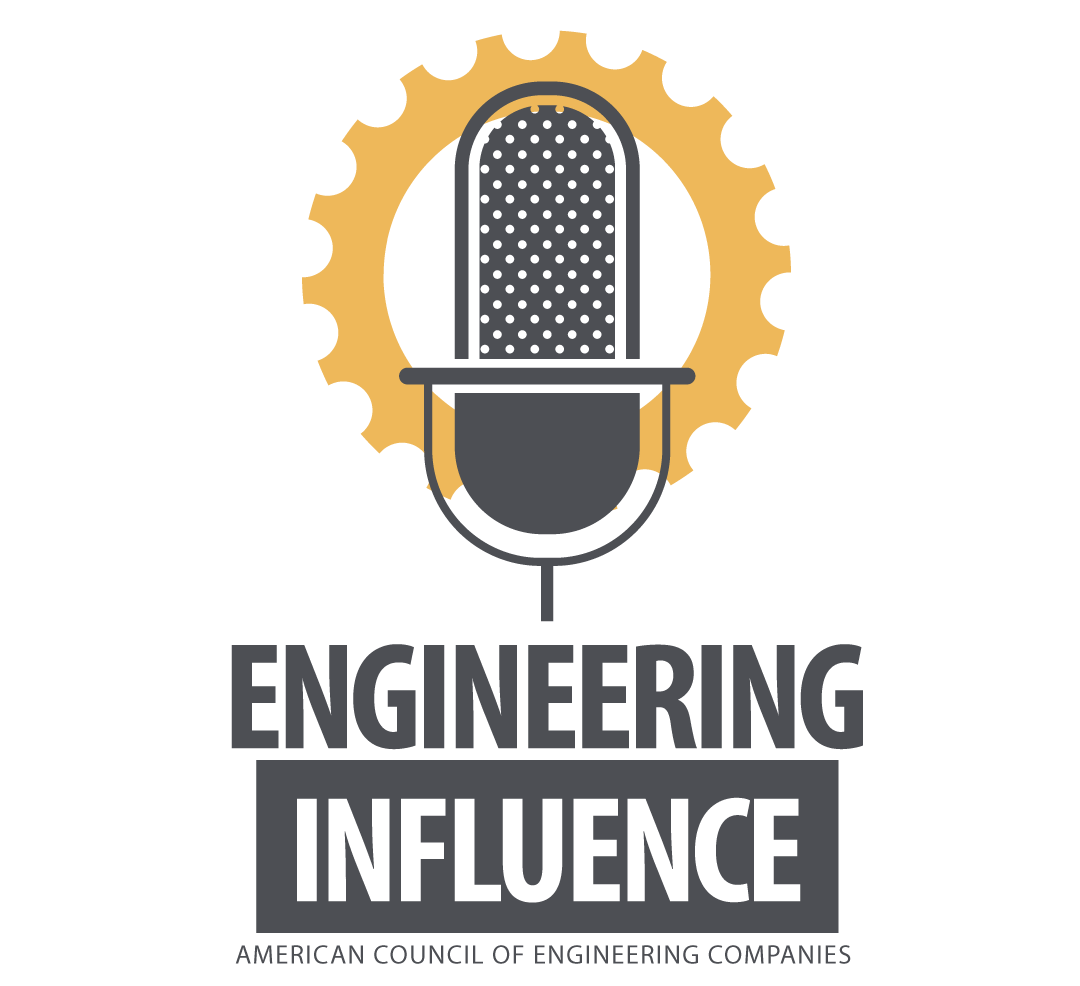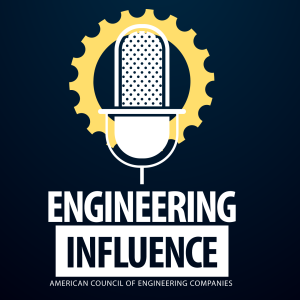
The Voice of the Business of Engineering
Engineering Influence is the official award-winning podcast of the American Council of Engineering Companies (ACEC).
ACEC is the trade association representing America's engineering firms; the businesses that design our built environment. Subscribe to the podcast for a variety of content ranging from interviews with newsmakers and elected officials to in-depth conversations on business trends, the economy, technology and what's next for the engineering and design services industry.
Visit us online at www.acec.org
Follow us on Twitter at @ACEC_National
ACEC reserves the right to moderate episodes on its channel and make editorial decisions on the inclusion or deletion of comments posted by listeners. Direct any questions to comms@acec.org.
Episodes

Thursday Nov 07, 2024
Revolutionizing Engineering: The Vertical SaaS Advantage
Thursday Nov 07, 2024
Thursday Nov 07, 2024
In this episode of the Engineering Influence podcast by the American Council of Engineering Companies, host Shreya, the Marketing & Communications Coordinator, is joined by Adam Loewentheil, co-founder and CEO of Aldoa. Together, they delve into the transformative power of technology in the engineering and consulting industries, emphasizing the evolution over the past 20 years and the promising direction it's headed towards.
Adam sheds light on the challenges faced by engineering firms in adapting to new technological advancements, highlighting the industry's reliance on outdated tools like Microsoft Word and Excel. He introduces Aldoa's innovative, verticalized SaaS solution, specifically designed to address these challenges, streamline workflows, and incorporate AI to enhance efficiency without compromising the scientific expertise of professionals.
The discussion extends to the benefits of vertical SaaS solutions, which are purpose-built for specific industries, offering tailored functionalities and cost savings. Adam shares insights into Aldoa's key offerings, including project management, resource management, and financial management tools, which have already attracted over 100 U.S. customers this year.
For those interested in learning more about Aldoa's solutions and how they can be customized for their business, Adam invites listeners to visit their website or reach out via email. Tune in to discover how Aldoa is revolutionizing the engineering and consulting landscape.
Visit Aldoa's website: www.aldoa.com

Monday Nov 04, 2024
Revolutionizing Civil Engineering: Bentley's AI-Powered OpenSite+
Monday Nov 04, 2024
Monday Nov 04, 2024
Welcome to the Engineering Influence Podcast from the American Council of Engineering Companies, recorded live at the 2024 Annual Fall Conference and sponsored by Bentley Systems. In this episode, we delve into the transformative impact of Bentley's new AI-powered software suite, OpenSite+, on the civil engineering industry.
Join our conversation with Francois Valois, VP of Civil Engineering, and David Settlemeyer, Senior Product Manager at Bentley, as they discuss how OpenSite+ is revolutionizing site design and land development. This groundbreaking software promises to equip engineers to deliver high-quality projects up to 10 times faster than traditional methods by leveraging AI-driven tools.
Discover how OpenSite+ stands out with its unique features, including a co-pilot experience that enhances productivity, automates drawing creation, and optimizes project workflows. Learn about the ethical considerations behind Bentley's data policy and the importance of data security for engineering firms. Explore the software's interoperability with other Bentley products and third-party applications, ensuring seamless integration and data accuracy throughout the project lifecycle.
Find out more about how OpenSite+ is setting a new standard in civil engineering and how firms can participate in its early access program. Tune in to understand how AI is reshaping the engineering landscape, allowing professionals to focus on what they do best—innovative design and exceptional client delivery.

Tuesday Oct 29, 2024
Navigating the Future of Data Management with Panzura
Tuesday Oct 29, 2024
Tuesday Oct 29, 2024
Join us for an insightful episode of Engineering Influence, recorded live from the American Council of Engineering Companies' 2024 fall conference in New Orleans. This episode, sponsored by Bentley, features a conversation with Don Foster, Chief Customer Officer at Panzura.
Discover how Panzura is revolutionizing data management by providing resilient solutions that help organizations handle unstructured data amidst growing cyber threats and evolving work environments. Don shares Panzura's approach to creating a robust infrastructure that ensures data accessibility and security, whether on-premises, cloud-based, or hybrid.
Explore the role of AI in enhancing data processes and the steps Panzura is taking to integrate machine learning for threat detection and workflow optimization. Learn how Panzura's innovative tools, such as CloudFS and Panzura Symphony, are empowering engineers to collaborate in real-time and complete projects more efficiently.
If you're interested in learning more about Panzura's offerings, visit their website for blogs, white papers, and upcoming webinars. Tune in to this episode to understand how Panzura is helping businesses thrive in the digital age.

Tuesday Oct 29, 2024
Celebrating 30 Years of Mentorship with ACE Mentor Program
Tuesday Oct 29, 2024
Tuesday Oct 29, 2024
Join us live from the fall conference in New Orleans as we dive into the impactful journey of the ACE Mentor Program with special guests Stephanie Davi McNeely, Director of Development and Strategic Partnerships, and Art Alzamora from ACE New York. Discover how this initiative, founded in 1994, has shaped the future of over 100,000 students, encouraging diversity and inclusion in engineering, architecture, and construction industries.
Learn about the program's core group mentoring model, its impressive scholarship achievements, and how it supports first-generation college students. Our guests share inspiring success stories, highlight key initiatives focused on alumni programming, and discuss the importance of mentorship in shaping future leaders.
Explore ways to get involved with ACE Mentor and hear about the collaborative efforts with the newly formed Engineering Workforce Consortium. This episode is a testament to the power of mentorship in bridging gaps and building a skilled, diverse workforce for tomorrow.

Monday Oct 28, 2024
Monday Oct 28, 2024
Welcome to the Engineering Influence Podcast from the American Council of Engineering Companies, recorded live at the 2024 Fall Conference. This special episode celebrates the achievements of our scholarship winners, highlighting the success of the expanded scholarship program by the ACEC Research Institute.
Join us as we chat with Ella Smith, a civil engineering student from Lawrence Technological University in Michigan. Ella shares her journey into the world of engineering, sparked by her love for math and science from an early age. She discusses her interest in geotechnical engineering, influenced by her exposure to public sector infrastructure and urban planning through her mother's career as a city planner.
Ella also talks about the exciting opportunities and technological advancements in the field of engineering today. As she prepares for graduation in May 2025, she looks forward to entering the workforce and finding a firm with a great workplace environment. Tune in to hear more about Ella's aspirations and insights into the evolving engineering landscape.

Friday Oct 25, 2024
Rethinking Mass Transit: Embracing Innovation for the Future with Stantec
Friday Oct 25, 2024
Friday Oct 25, 2024
Welcome to the Engineering Influence Podcast by the American Council of Engineering Companies. In this episode, we delve into the future of transportation, focusing on mass transit, with expert insights from Stuart Lerner, Executive Vice President and Chief Operating Officer for Stantec North America.With over 30 years of experience in transportation infrastructure and transit-oriented projects, Stuart shares his personal and professional journey in the world of mass transit. He discusses the challenges commuters face and the legendary war stories that have become part of urban folklore. Stuart emphasizes the need for innovative solutions to improve commuting experiences and reduce traffic congestion.As the discussion unfolds, Stuart highlights the impact of the pandemic and climate change on transportation, particularly in urban centers like New York City. He explores the controversial concept of congestion pricing and its potential to fund mass transit improvements. Stuart also addresses the financial sustainability of mass transit systems and the need for alternative approaches to meet changing commuter demands.Join us as we explore the possibilities of a hybrid transportation model, incorporating technologies like autonomous vehicles and bus rapid transit. Stuart advocates for embracing new technology to create flexible and reliable mass transit systems that adapt to post-pandemic realities and environmental challenges.Don't miss this insightful conversation on the future of transportation and the role of technology in shaping a more sustainable and efficient commuting experience.

Friday Oct 25, 2024
Unveiling Success: San Diego's Excellence in Qualifications-Based Selection
Friday Oct 25, 2024
Friday Oct 25, 2024
Welcome to the Engineering Influence Podcast from ACEC, broadcasting from our Fall Conference 2024, proudly sponsored by Bentley. In this episode, we spotlight the City of San Diego, the distinguished winners of the Qualifications-Based Selection (QBS) award. Join us as we delve into a conversation with Claudia Barca, Director of Purchasing and Contracting, and Elif Chetting, Acting Director with Engineering Capital Projects, as they share insights on San Diego's exemplary QBS implementation. Discover how San Diego has set a national benchmark by prioritizing qualifications over price in architectural and engineering contracts. Learn about the meticulous process that ensures the selection of top-tier professionals, fostering successful project outcomes that benefit both the city and its citizens. Claudia and Elif provide an in-depth look at the criteria considered during the selection process, emphasizing technical expertise, team capabilities, and an understanding of local needs. Explore the benefits of QBS, from fostering industry partnerships to enhancing community projects, and understand the passion driving public service delivery in San Diego. The episode also highlights opportunities for small local businesses to collaborate on significant projects, contributing to community development and showcasing their capabilities. Tune in to hear how San Diego's commitment to quality-based selection continues to make a positive impact on the city's infrastructure and its residents. Celebrate the success stories and the rewarding experience of contributing to the community's growth and well-being.

Friday Oct 25, 2024
Embracing AI: Engineering's Journey to a Smarter Future
Friday Oct 25, 2024
Friday Oct 25, 2024
Join us on the Engineering Influence Podcast from the American Council of Engineering Companies as we delve into the transformative power of AI at the 2024 Fall Conference in New Orleans. Sponsored by Bentley, this episode features an enlightening discussion with Didem Un Ates, a pioneer in AI development with a rich history at companies like OpenAI, Microsoft, and now Lotus AI. Discover the rapid evolution of AI technologies and their impact on engineering and beyond. Didem shares insights into the journey of AI, from its inception to its current state, and the pivotal role of ChatGPT in making AI accessible at a consumer level. Learn how engineering firms can harness AI to create efficiencies, and explore the balance between human expertise and AI agents in the workplace. We also tackle the critical issue of responsible AI, discussing its environmental impacts and the opportunities for innovation within the engineering industry to mitigate these effects. Didem offers a hopeful perspective on the future of work, emphasizing the enduring value of human creativity and wisdom in an AI-driven world. Tune in to understand how AI is reshaping the engineering landscape and why now is the time to embrace this technology for a brighter, more efficient future.





